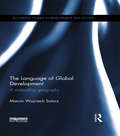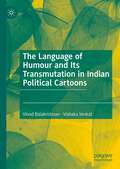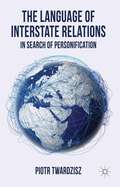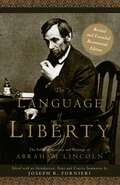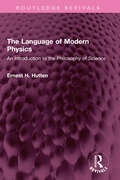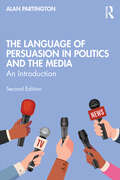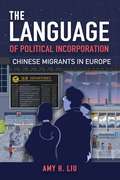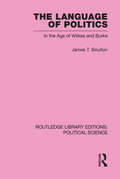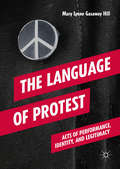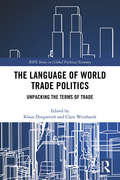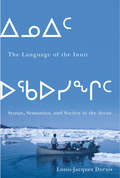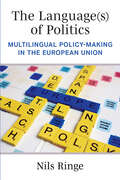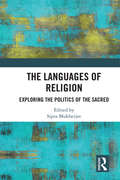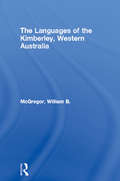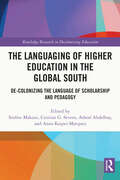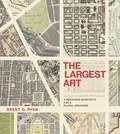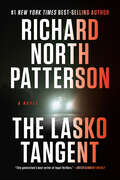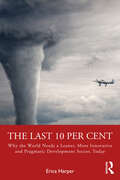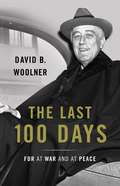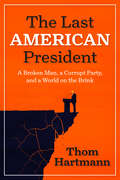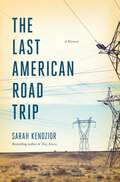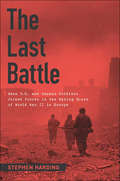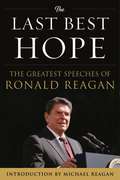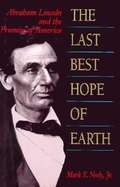- Table View
- List View
The Language of Global Development: A Misleading Geography (Routledge Studies in Development and Society)
by Marcin Wojciech SolarzTerms such as "Third World", "developing countries" and "Global South" are ubiquitous in the discipline of development studies, but they are often poorly defined, ideologically weighted and misleading. Taking an intellectual history approach, this book examines the most commonly used spatial terms in the language of development, tracing their origins, meanings, evolution and processes of popularisation and demonstrating how geographical, political and economic concepts were used or misused in creating these terms. The book looks at the origins and the changing nature of fundamental development divisions from prehistoric times to the present day and analyses the process of conceptualising the contemporary North-South divide, focusing especially on the start of spatial development terminology in the twentieth century. It uses detailed maps to assist the reader in visualising the geographical complexities of these spatial terms, and discusses more recently developed terms, such as "emerging markets" and "BRIC", which are key to understanding the modern world. This book provides a valuable resource for students and researchers in development studies, international relations, geography, sociology and anthropology, as well as practitioners in the field of development.
The Language of Humour and Its Transmutation in Indian Political Cartoons
by Vinod Balakrishnan Vishaka VenkatThis book develops a model to examine the language of humour, which is multimodal and accounts for the possibility of transmutation of humour as it is performed through editorial cartoons. By transmutation is meant the transition in the language of humour when it crosses its own boundaries to provoke unprecedented reactions resulting in offensiveness, disappointment or hurt sentiment. The transmutability about the language of humour points to its inherently diabolical nature which manifests in the performance of controversial cartoons. The model is built by borrowing theoretical cues from Roman Jakobson, Roland Barthes, George Lakoff and Mark Johnson. The integrated model, then, is developed to examine the cartoons which were recommended for deletion by the Thorat Committee, following a cartoon controversy in India. Through the cartoon analysis, the model discerns the significance of context and temporality in determining the impact of humour. It also examines how the ethics of humour; the blurred lines of political correctness and incorrectness are dictated by the political atmosphere and the power dynamics.
The Language of Interstate Relations
by Piotr TwardziszIn challenging the widely held belief in the ubiquity of the personification of the political state, this book strives to de-politicize research and to de-mystify conceptual metaphor. Opposed to mainstream cognitive assumptions, it provides detailed data-driven research and one realistic solution to many of the dilemmas.
The Language of Liberty: The Political Speeches And Writings Of Abraham Lincoln:bicentennial Edition (Gateway Heritage Series)
by Joseph R. FornieriThe Civil War is a defining event in American history and Abraham Lincoln is the central figure of both the Civil War and American history. In his struggle to preserve the Union and redeem the nation from the original sin of slavery, Abraham Lincoln provided the most compelling expression of the American Dream and the preeminent justification of the American regime. Indeed, at Gettysburg he distilled the very essence of the nation's political creed. His political thought and leadership are of enduring significance to democracy at home and abroad. <P><P>To further appreciate and perpetuate Lincoln's legacy, The Language of Liberty offers the definitive one-volume collection of the Sixteenth President's speeches and writings. Unlike so many other collections, in which Lincoln's speeches and writings have been substantially edited, this volume provides a comprehensive selection of the Sixteenth President's most important speeches and writings in their entirety.The volume is conveniently divided both chronologically and thematically into five periods/chapters from 1832-1865. <P><P>A final chapter offers a compilation of Lincoln's speeches and writings on the theme of religion and politics. Each speech is preceded by an informative head-note, which places Lincoln's words in context for the reader. In addition, each period/chapter includes a concise historical, political, and biographical overview of the major events in Lincoln's life and the life of the nation, thereby providing an even wider context for understanding the Sixteenth President's language of liberty. <P><P>To assist the reader, crucial terms, dates, events and issues of the Civil War have been defined. Also unique to this volume is the final section on Lincoln's Political Faith, which includes an offering of his public and private utterances on religion, and a definition of this political faith based upon the first principles of the Declaration of Independence.A selected bibliography of secondary sources has been included for further reading on various topics related to the Sixteenth President. <P><P>Finally, the volume includes an extensive introduction on Lincoln's Prudent Leadership and his application of the natural law to the circumstances of the Civil War Era. Indeed, this introduction provides a crucial understanding of the relationship between Lincoln's political thought and political action, between the world of theory and practice. <P><P>In sum, The Language of Liberty provides an indispensable guide to the lay reader, the Lincoln aficionado, and the scholar. All now have access to a single volume collection of his great political speeches and writings with unedited versions, concise historical overviews, and scholarly reflections on the enduring significance of Lincoln's political philosophy.
The Language of Modern Physics: An Introduction to the Philosophy of Science (Routledge Revivals)
by Ernest H. HuttenFirst published in 1956 The Language of Modern Physics gives a complete account of the concepts both of classical and quantum physics. The first part of the book deals with modern logic and semantics and discussion is based on the semantic conception of truth and leads up to the criterion of meaning. The second and main part of the book is about basic ideas of physics. Here the model which underlies a scientific theory is of greatest import; in most instances the model is tacitly assumed, but we must bring it into the open if we want to understand the theory. The third and last part deals with the methods scientists use for confirming their hypotheses. This book is a must read for students and scholars of philosophy of science and philosophy in general.
The Language of Persuasion in Politics and the Media: An Introduction
by Alan PartingtonThis bestselling introductory textbook examines the relationship between politicians, the press and the public through the language they employ. Now fully revised with new material on delegitimisation, ‘fake news’, disinformation, (self-)censorship, ‘conspiracy theories’ and ‘Zombie’ narratives, key topics include:• Evaluation, the ‘engine’ of persuasion.• ‘Spin’, ‘spin control’ and ‘image’ politics.• Models of persuasion, including authority, contrast, problem-solution, association, ‘garden path.’• Pseudo-logical and ‘post-truth’ arguments.• Humour, irony and satire.• Metaphors: use, misuse and dangers.• Election rhetoric.Extracts from speeches, soundbites, newspapers and blogs, social media, interviews, press conferences, election slogans and satires are used to provide the reader with the tools to discover the beliefs, character and hidden strategies of the would-be persuader, as well as the counter-strategies of their targets. This book demonstrates how the study of language use can help us appreciate, exploit and protect ourselves from the art of persuasion.With a wide variety of practical examples, on both recent issues and historically significant ones, every topic is complemented with guiding tasks, queries and exercises, with keys and commentaries at the end of each unit. This highly original textbook is ideal for all introductory courses on language and politics, media language, rhetoric and persuasion, discourse studies and related areas.
The Language of Political Incorporation: Chinese Migrants in Europe (Asian American History And Cultu Ser. #225)
by Amy LiuIn this groundbreaking study, The Language of Political Incorporation, Amy Liu focuses on Chinese migrants in Central-Eastern Europe and their varying levels of political incorporation in the local community. She examines the linguistic diversity of migrant networks, finding institutional trust and civic engagement depend not on national identity, but on the network’s linguistic diversity—namely, whether the operating language is a migrant’s mother tongue or a lingua franca. The Language of Political Incorporation uses original survey data to assess when the Chinese engage positively with the authorities and when they become civic minded. The results are surprising. In Hungary, the Chinese community has experienced high levels of political incorporation in part because they have not been targeted by anti-immigrant rhetoric and policies. In contrast, migrants in Romania sought the assistance of the Chinese embassy to fight an effort to collect back taxes. Liu also compares the Chinese experiences in Central-Eastern Europe with those of Muslims in the region, as well as how the Chinese are treated in Western Europe. Additionally, she considers how the local communities perceive the Chinese. The Language of Political Incorporation concludes by offering best practices for how governments can help migrants become more trusting of—and have greater involvement with—locals in their host countries. Ultimately, Liu demonstrates the importance of linguistic networks for the incorporation of immigrants.
The Language of Political Incorporation: Chinese Migrants in Europe (Asian American History And Cultu Ser. #225)
by Amy LiuIn this groundbreaking study, The Language of Political Incorporation, Amy Liu focuses on Chinese migrants in Central-Eastern Europe and their varying levels of political incorporation in the local community. She examines the linguistic diversity of migrant networks, finding institutional trust and civic engagement depend not on national identity, but on the network’s linguistic diversity—namely, whether the operating language is a migrant’s mother tongue or a lingua franca. The Language of Political Incorporation uses original survey data to assess when the Chinese engage positively with the authorities and when they become civic minded. The results are surprising. In Hungary, the Chinese community has experienced high levels of political incorporation in part because they have not been targeted by anti-immigrant rhetoric and policies. In contrast, migrants in Romania sought the assistance of the Chinese embassy to fight an effort to collect back taxes. Liu also compares the Chinese experiences in Central-Eastern Europe with those of Muslims in the region, as well as how the Chinese are treated in Western Europe. Additionally, she considers how the local communities perceive the Chinese. The Language of Political Incorporation concludes by offering best practices for how governments can help migrants become more trusting of—and have greater involvement with—locals in their host countries. Ultimately, Liu demonstrates the importance of linguistic networks for the incorporation of immigrants.
The Language of Politics (Routledge Library Editions: Political Science #39)
by James T. BoultonThis book focuses on the literature produced at the time of the controversy over Wilkes and the Middlesex elections and by the debate in England over the French Revolution. Writings by Junius, Johnson, Burke, Paine, Mackintosh, Wollstonecraft and Arthur Young among others are examined in order to identify and estimate the effectiveness of the persuasive techniques used by these writers to communicate ideas to their respective audiences. Godwin is also given a new assessment. A view of the extent and urgency over the French Revolution is provided by the chronological survey of replies to Burke’s Reflections given in an appendix.
The Language of Protest: Acts Of Performance, Identity, And Legitimacy
by Mary Lynne Gasaway HillRooted in the performative of Speech Act Theory, this interdisciplinary study crafts a new model to compare the work we do with words when we protest: across genres, from different geographies and languages. Rich with illustrative examples from Turkey, U.S., West Germany, Romania, Guatemala, Great Britain, and Northern Ireland, it examines the language of protest (chants, songs, poetry and prose) with an innovative use of analytical tools that will advance current theory. Operating at the intersection of linguistic pragmatics and critical discourse analysis this book provides fresh insights on interdisciplinary topics including power, identity, legitimacy and the Social Contract. In doing so it will appeal to students and scholars of sociolinguistics, pragmatics and critical discourse analysis, in addition to researchers working in sociology, political science, discourse, cultural and communication studies.
The Language of World Trade Politics: Unpacking the Terms of Trade (RIPE Series in Global Political Economy)
by Klaus Dingwerth Clara WeinhardtOutcomes in major multilateral trade negotiations are conventionally explained as resulting from interests weighted by (trading) power. Offering a different overview of the concepts we use to talk about the international trade regime, this edited collection puts the ideational foundation of world trade politics centre stage, and critically examines the terms in which we make sense of world trade politics. The concepts used to make sense of world trade politics are often employed strategically, making some aspects of reality visible and others invisible. Reflecting upon ten key concepts from ‘trade’ itself to ‘protectionism’ and ‘justice’, this book poses two broad questions: first, how and by whom have the meanings of different terms used to describe, challenge and defend world trade politics been constructed? Second, how have the individual terms changed over time, and with what consequences? The editors and contributors draw on a broad range of theoretical approaches, from post-structuralism or cognitivism to normative theory, shedding new light on why certain trade issues and agendas win out over others, who benefits from the current system of trade governance, and what contemporary challenges the World Trade Organization faces. In doing so, the book speaks to a growing and diverse constructivist literature in International Political Economy. This book will be of interest to scholars, students and policy professionals working within International Relations, International Political Economy and economics.
The Language of the Inuit: Syntax, Semantics, and Society in the Arctic (McGill-Queen's Indigenous and Northern Studies #58)
by Louis-Jacques DoraisThe culmination of forty years of research, The Language of the Inuit maps the geographical distribution and linguistic differences between the Eskaleut and Inuit languages and dialects. Providing details about aspects of comparative phonology, grammar, and lexicon as well as Inuit prehistory and historical evolution, Louis-Jacques Dorais shows the effects of bilingualism, literacy, and formal education on Inuit language and considers its present status and future. An enormous task, masterfully accomplished, The Language of the Inuit is not only an anthropological and linguistic study of a language and the broad social and cultural contexts where it is spoken but a history of the language's speakers.
The Language(s) of Politics: Multilingual Policy-Making in the European Union
by Nils RingeMultilingualism is an ever-present feature in political contexts around the world, including multilingual states and international organizations. Increasingly, consequential political decisions are negotiated between politicians who do not share a common native language. Nils Ringe uses the European Union to investigate how politicians’ reliance on shared foreign languages and translation services affects politics and policy-making. Ringe's research illustrates how multilingualism is an inherent and consequential feature of EU politics—that it depoliticizes policy-making by reducing its political nature and potential for conflict. An atmosphere with both foreign language use and a reliance on translation leads to communication that is simple, utilitarian, neutralized, and involves commonly shared phrases and expressions. Policymakers tend to disregard politically charged language and they are constrained in their ability to use vague or ambiguous language to gloss over disagreements by the need for consistency across languages.
The Languages of Religion: Exploring the Politics of the Sacred
by Sipra MukherjeeThis book analyses the power that religion wields upon the minds of individuals and communities and explores the predominance of language in the actual practice of religion. Through an investigation of the diverse forms of religious language available — oral traditions, sacred texts, evangelical prose, and national rhetoric used by ‘faith-insiders’ such as missionaries, priests, or religious leaders who play the communicator’s role between the sacred and the secular — the chapters in the volume reveal the dependence of religion upon language, demonstrating how religion draws strength from a past that is embedded in narratives, infusing the ‘sacred’ language with political power. The book combines broad theoretical and normative reflections in contexts of original, detailed and closely examined empirical case studies. Drawing upon resources across disciplines, the book will be of interest to scholars of religion and religious studies, linguistics, politics, cultural studies, history, sociology, and social anthropology.
The Languages of the Kimberley, Western Australia
by William B. McGregorThe Kimberley, the far north-west of Australia, is one of the most linguistically diverse regions of the continent. Some fifty-five Aboriginal languages belonging to five different families are spoken within its borders. Few of these languages are currently being passed on to children, most of whom speak Kriol (a new language that arose about half a century ago from an earlier Pidgin English) or Aboriginal English (a dialect of English) as their mother tongue and usual language of communication. This book describes the Aboriginal languages spoken today and in the recent past in this region.
The Languaging of Higher Education in the Global South: De-Colonizing the Language of Scholarship and Pedagogy (Routledge Research in Decolonizing Education)
by Sinfree Makoni Anna Kaiper-Marquez Cristine G. Severo Ashraf AbdelhayBy foregrounding language practices in educational settings, this timely volume offers a postcolonial critique of the languaging of higher education and considers how Southern Epistemologies can be used to further the decolonization of post-secondary education in the Global South. Offering a range of contributions from diverse and minoritized scholars based in countries including South Africa, Rwanda, Sudan, Qatar, Turkey, Portugal, Sweden, India and Brazil, The Languaging of Higher Education in the Global South problematizes the use of language in various areas of higher education. Chapters demonstrate both subtle and explicit ways in which the language of pedagogy, scholarship, policy, and partcipiation endorse and privelege Western constructs and knowledge production, and utilize Southern theories and epistemologies to offer an alternative ways forward – practice and research which applies and promotes Southern epistemologies and local knowledges. The volume confronts issues including integrationism, epistemic solidarity, language policy and ideology, multilingualism, and the increasing use of technology in institutions of higher education. This innovative book will be of interest to researchers, scholars, and postgraduate students in the fields of higher education, applied linguistics, and multicultural education. Those with an interest in the decolonization of education and language will find the book of particular use.
The Largest Art: A Measured Manifesto for a Plural Urbanism (The\mit Press Ser.)
by Brent D. RyanWhy urban design is larger than architecture: the foundational qualities of urban design, examples and practitionersUrban design in practice is incremental, but architects imagine it as scaled-up architecture—large, ready-to-build pop-up cities. This paradox of urban design is rarely addressed; indeed, urban design as a discipline lacks a theoretical foundation. In The Largest Art, Brent Ryan argues that urban design encompasses more than architecture, and he provides a foundational theory of urban design beyond the architectural scale. In a “declaration of independence” for urban design, Ryan describes urban design as the largest of the building arts, with qualities of its own.Ryan distinguishes urban design from its sister arts by its pluralism: plural scale, ranging from an alleyway to a region; plural time, because it is deeply enmeshed in both history and the present; plural property, with many owners; plural agents, with many makers; and plural form, with a distributed quality that allows it to coexist with diverse elements of the city. Ryan looks at three well-known urban design projects through the lens of pluralism: a Brancusi sculptural ensemble in Romania, a Bronx housing project, and a formally and spatially diverse grouping of projects in Ljubljana, Slovenia. He revisits the thought of three plural urbanists working between 1960 and 1980: David Crane, Edmund Bacon, and Kevin Lynch. And he tells three design stories for the future, imaginary scenarios of plural urbanism in locations around the world.Ryan concludes his manifesto with three signal considerations urban designers must acknowledge: eternal change, inevitable incompletion, and flexible fidelity. Cities are ceaselessly active, perpetually changing. It is the urban designer's task to make art with aesthetic qualities that can survive perpetual change.
The Lasko Tangent: A Novel
by Richard North Patterson"Mr. Patterson is a natural storyteller....Fast moving...A handsome job."--The New York Times William Lasko is a self-made millionaire with an eye for wealth and influence, the ear of the president, and a talent for using both to get what he wants. Now the Economic Crime Commission wants Lasko brought down, and US Attorney Christopher Paget is tipped to take on the job.
The Last 10 Per Cent: Why the World Needs a Leaner, More Innovative and Pragmatic Development Sector, Today
by Erica HarperCriticism that the development sector has not delivered in terms of eliminating extreme poverty, fast-tracking growth and preventing conflict, is neither new nor surprising. In fact, it may be the one thing that scholars, donors and practitioners agree on. While many of these concerns are valid, this book makes a case that the sector is closer to unlocking the gates to more effective and efficient development outcomes than is popularly believed. Specifically, it argues that by overturning a few myths, making better use of evidence and employing some different rules, practitioners, policy specialists and donors can foster the changes in the development architecture that are needed to reach the 10 percent of the world’s population still living in extreme poverty. Engaging, provocative and clear sighted, the book provides insight into interventions around democratic governance, refugee response, counterterrorism, gender mainstreaming, environmental protection and private sector engagement. It is instructive reading for professionals across the development sector, think tanks and NGOs.
The Last 100 Days: FDR at War and at Peace
by David B. WoolnerA revealing portrait of the end of Franklin Delano Roosevelt's life and presidency, shedding new light on how he made his momentous final policy decisionsThe first hundred days of FDR's presidency are justly famous, often viewed as a period of political action without equal in American history. Yet as historian David B. Woolner reveals, the last hundred might very well surpass them in drama and consequence.Drawing on new evidence, Woolner shows how FDR called on every ounce of his diminishing energy to pursue what mattered most to him: the establishment of the United Nations, the reinvigoration of the New Deal, and the possibility of a Jewish homeland in Palestine. We see a president shorn of the usual distractions of office, a man whose sense of personal responsibility for the American people bore heavily upon him. As Woolner argues, even in declining health FDR displayed remarkable political talent and foresight as he focused his energies on shaping the peace to come.
The Last American President: A Broken Man, a Corrupt Party, and a World on the Brink
by Thom HartmannFrom bestselling progressive talk show host Thom Hartmann comes an urgent autopsy of American democracy, showing how plutocrats, political cowardice, and systemic rot built the perfect runway for Trump's authoritarian ascent.The Last American President rips open America's wounded democracy to expose a terrifying truth: Donald Trump isn't an anomaly—he's the inevitable product of a system engineered to fail. This searing investigation reveals how a man forged by childhood trauma, pathological narcissism, and calculated cruelty didn't hijack democracy—he was handed the keys by those who should have been its guardians.Hartmann uncovers the unholy alliance between Trump's damaged psyche and America's rotted institutions. From Fred Trump's brutal parenting to Roy Cohn's lessons in shamelessness, from a Republican Party that traded principles for power to billionaire donors who treated democracy as a profit center, this book exposes the assembly line that manufactured an authoritarian.But this is about more than Trump's past—it's about America's future. As climate catastrophe accelerates and fascism spreads globally, Hartmann reveals the nightmare scenario: a second Trump term that doesn't just end American democracy but also triggers irreversible planetary damage. Through meticulous research and unflinching analysis, he shows how political cowardice and corporate greed created the perfect storm that could extinguish humanity's last chance at survival.This isn't just political commentary—it's a last-minute alarm sounding before the point of no return.
The Last American Road Trip: A Memoir
by Sarah KendziorUSA Today bestsellerAmerican Booksellers Association bestsellerThe New York Times bestselling author of They Knew, Hiding in Plain Sight, and The View from Flyover Country navigates a changing America as she and her family embark on a series of road trips, in a book that is part memoir, part history, and wholly unique. It is one thing to study the fall of democracy, another to have it hit your homeland -- and yet another to raise children as it happens. The Last American Road Trip is one family’s journey to the most beautiful, fascinating, and bizarre places in the US during one of its most tumultuous eras. As Kendzior works as a journalist chronicling political turmoil, she becomes determined that her young children see America before it’s too late. So Kendzior, her husband, and the kids hit the road -- again and again.Starting from Missouri, the family drives across America in every direction as cataclysmic events –- the rise of autocracy, political and technological chaos, and the pandemic –- reshape American life. They explore Route 66, national parks, historical sites, and Americana icons as Kendzior contemplates love for country in a broken heartland. Together, the family watches the landscape of the United States -- physical, environmental, social, political -- transform through the car window.Part memoir, part political history, The Last American Road Trip is one mother’s promise to her children that their country will be there for them in the future –- even though at times she struggles to believe it herself.
The Last Battle: When U.S. and German Soldiers Joined Forces in the Waning Hours of World War II in Europe
by Stephen HardingThe true story of US & German soldiers fighting side by side in the final days of WW II
The Last Best Hope
by Ronald Reagan Michael ReaganFrom the time he arrived on the political scene in 1964 - throughout his presidency and beyond, Ronald Reagan - used his speeches to inspire and reinvigorate America. When he spoke, Reagan, said, he was "preaching a sermon." The American people saw his vision of America and his dreams for the future and they overwhelmingly responded; he was re-elected in 984 by the largest number of electoral votes in the nation's history.Here in this collection of twenty-eight speeches spanning the Reagan era, readers can find inspiration in Reagan's "sermons." From his first speech in the political arena in 1964 to his Last Letter to America, informing Americans of his Alzheimer's disease, Ronald Regan's words show a profound belief in God, freedom, individualism, limited government, and his great love for his country. In addition to an introduction by Reagan's son, Michael Reagan, each speech features an informative introduction which puts the speech into historical context, making The Last Best Hope the perfect entrée into the influence of one of the major figures of the 20th century.
The Last Best Hope of Earth: Abraham Lincoln and the Promise of America
by Mark E. NeelyMark E. Neely, Jr. , gives us the first compact biography of Abraham Lincoln based on new scholarship. Neely, a Pulitzer prize-winning historian, vividly recaptures the central place of politics in Lincoln's life. Richly illustrated, nuanced and accessible, written with attention to the age in which Lincoln lived, yet ever alert to universal moral questions, this book provides a portrait of Lincoln as an extraordinary man in his own time and ours.
